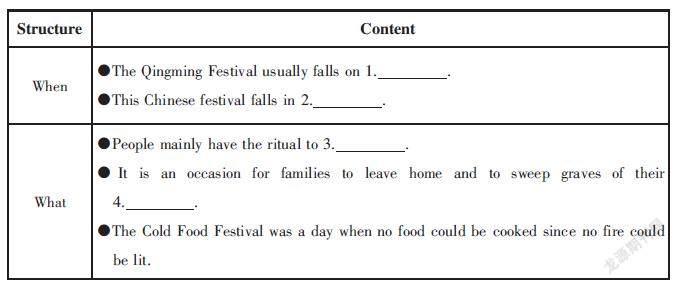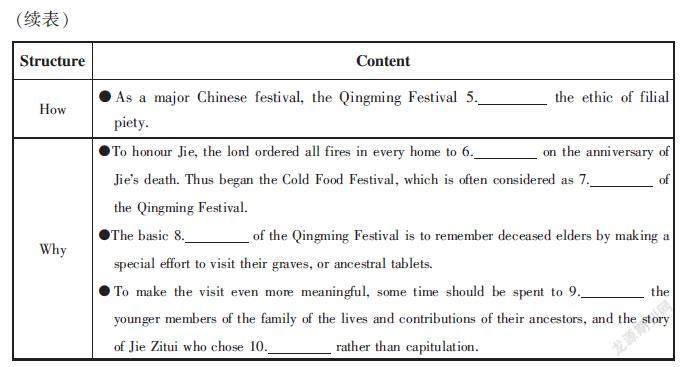中国传统节日
2022-04-08钟婧
钟婧


The Qingming Festival is also called Tomb?鄄Sweeping Day. It usually falls on April 4th or 5th. It is a time to remember the dearly departed. More importantly, it is a period to pay respect to one?蒺s ancestors and deceased family members, during which people mainly have the ritual to sweep tombs. Because it strengthens the ethic of filial piety (孝道), the Qingming Festival is a major Chinese festival.
Literally meaning “clear” (qing) and “bright” (ming), this Chinese festival falls in early spring. It is a “spring” festival, and it is an occasion for families to leave home and to sweep the graves of their ancestors. This sweeping of the graves is given an extended period, that is, 10 days before and after the Qingming Festival. In some places, a whole month is distributed.
The Qingming Festival is popularly associated with Jie Zitui, who lived in Shanxi Province in 600 BC. Legend has it that Jie saved his starving lord?蒺s life by serving a piece of meat from his own leg. When the lord succeeded in becoming the ruler of a small country, he invited all his other faithful followers to join him. However, Jie declined his invitation, preferring to lead a hermit?蒺s (隱士的) life with his mother in the mountains.
Believing that he could force Jie to get out by burning the mountains, the lord ordered his men to set the forest on fire. To his astonishment, Jie chose to remain where he was and was burnt to death. The lord was deeply saddened by this tragedy. To honour Jie, the lord ordered all fires in every home to be put out on the anniversary of Jie?蒺s death. Thus began the Cold Food Festival, a day when no food could be cooked since no fire could be lit.
The Cold Food Festival occurs before the Qingming Festival and is often considered as part of the Qingming Festival. As time passed, the Qingming Festival replaced the Cold Food Festival. Whatever practice is observed, the basic thing of the Qingming Festival is to remember deceased elders by making a special effort to visit their graves, or ancestral tablets (祖先灵位). To make the visit even more meaningful, some time should be spent to remind the younger members of the family of the lives and contributions of their ances?鄄tors, and the story of Jie Zitui who chose death rather than capitulation (屈服).
Activity A Reading for understanding
Ⅰ. Text?鄄centered chunks
fall on (节日等)适逢(某日);正当(某日)
pay respect to 向……致敬
be associated with 与……有关;和……联系在一起
succeed in doing sth 做成某事;在某事上獲得成功
set sth on fire 点燃某物;放火烧某物
put out 熄灭;扑灭
remind sb of sth 提醒某人某事
Ⅱ. Textcentered sentences
一、定语从句
1. More importantly, it is a period to pay respect to one?蒺s ancestors and deceased family members, during which people mainly have the ritual to sweep tombs. 更重要的是,这是一个致敬祖先和已故的家庭成员的日子,在这期间,人们有扫墓的习俗。
【点石成金】during which people mainly have the ritual to sweep tombs是“介词+关系代词”引导的定语从句,对period进行了补充说明。其中,during which在从句中作时间状语。
【运用迁移】他将把野餐活动推迟到5月1日,那时他会有空。
2. The Qingming Festival is popularly associated with Jie Zitui, who lived in Shanxi Province in 600 BC. 清明节通常与公元前600年生活在山西的介子推联系在一起。
【点石成金】who lived in Shanxi Province in 600 BC是非限制性定语从句,对介子推进行了补充说明。其中,who在从句中作主语。
【运用迁移】史密斯先生是一位著名的科学家,我从他那儿学到了许多东西。
二、非谓语
However, Jie declined his invitation, preferring to lead a hermit?蒺s life with his mother in the mountains. 然而,介子推拒绝了他的邀请,宁愿和他的母亲在山里过隐居的生活。
【点石成金】preferring to lead a hermit?蒺s life with his mother in the mountains意为“宁愿和他的母亲在山里过隐居的生活”,是V?鄄ing作伴随状语的结构。
【运用迁移】我滑倒在玻璃地面上,摔断了胳膊。
Activity B Reading for writing
假定你是李华,请你以“A traditional Chinese festival—Qingming Festival”为题写一篇短文,介绍清明节。内容要点:
1. 清明节的由来;
2. 清明节的意义。
注意:
1. 词数80左右;
2. 可以适当增加细节,以使行文连贯;
3. 至少需要使用一个定语从句或非谓语;
4. 注意段落内的逻辑关系。
A traditional Chinese festival—Qingming Festival
写作导引
本次的写作任务是写一篇介绍节日由来及其意义的短文,要求学生介绍中国传统节日——清明节,并且至少需要使用一个定语从句或非谓语。这些写作要求和所给语篇的主题语境是紧密相关的。我们可以通过整合同主题阅读材料的内容和语言,梳理写作思路和积累素材。
一、语篇解码
(一)内容分析
What is the text mainly about?
(二)宏观结构
Fill in the blanks according to the text.
二、素材积累
(一)社会风俗与文化的核心表达
1. enjoy a reunion dinner 吃团圆饭
2. visit relatives and friends 走亲访友
3. give lucky money in red paper 给压岁钱
4. paste the Spring Festival couplets on the door 在门上贴春联
5. raise lanterns 挂灯笼
6. guess lantern riddles 猜灯谜
7. dragon boat race 龙舟赛
8. admire the full moon 赏月
9. spread traditional Chinese culture 传播中国传统文化
10. contribute to the economic and cultural development 促进经济和文化的发展
11. get a better understanding of Chinese culture and customs 对中国的文化和风俗习惯有更好的了解
12. in memory/honour of the ancestors 为了纪念祖先
13. increase one?蒺s knowledge about the local custom 增进某人对当地风俗习惯的了解
(二)节日意义的核心句型
1. It has been playing an increasingly important role in our daily life; it has brought us a lot of benefits but has created some problems as well. 它在我们的日常生活中起着越来越重要的作用;它给我们带来了很多好处,但同时也引发了一些问题。
2. Celebrating festivals is a good way to hand down traditions. 庆祝节日是传承传统的好方法。
3. In my opinion, with the improvement of..., ...has caught the world?蒺s attention. 在我看来,随着……的提升, ……吸引了世界的关注。
4. People hold the festival in order to..., which helps us inherit our culture. 人们举行这个节日是为了……,这帮助我们传承文化。
5. From what has been discussed above, we may reasonably arrive at the conclusion that... 综上所述,我们可以合理地得出结论……
三、写作支架
本次的写作任务是写一篇介绍节日由来及其意义的文章,根据写作要求,其语篇结构可定为“介绍由来+分析意义”。文章的框架如下:
A traditional Chinese festival—Qingming Festival
I?蒺m more than glad to introduce to you. falls on . It originated from .
During , people . It is a period to .
四、語篇过手
根据以上提供的主题、主题表达和语篇结构,写出一篇介绍节日由来及其意义的短文。第一段介绍节日由来,第二段分析、阐述节日意义。总词数控制在80左右。
同时,学习运用前文阅读材料中出现的定语从句或非谓语。注意表达的内在逻辑关系和使用恰当的连词。
